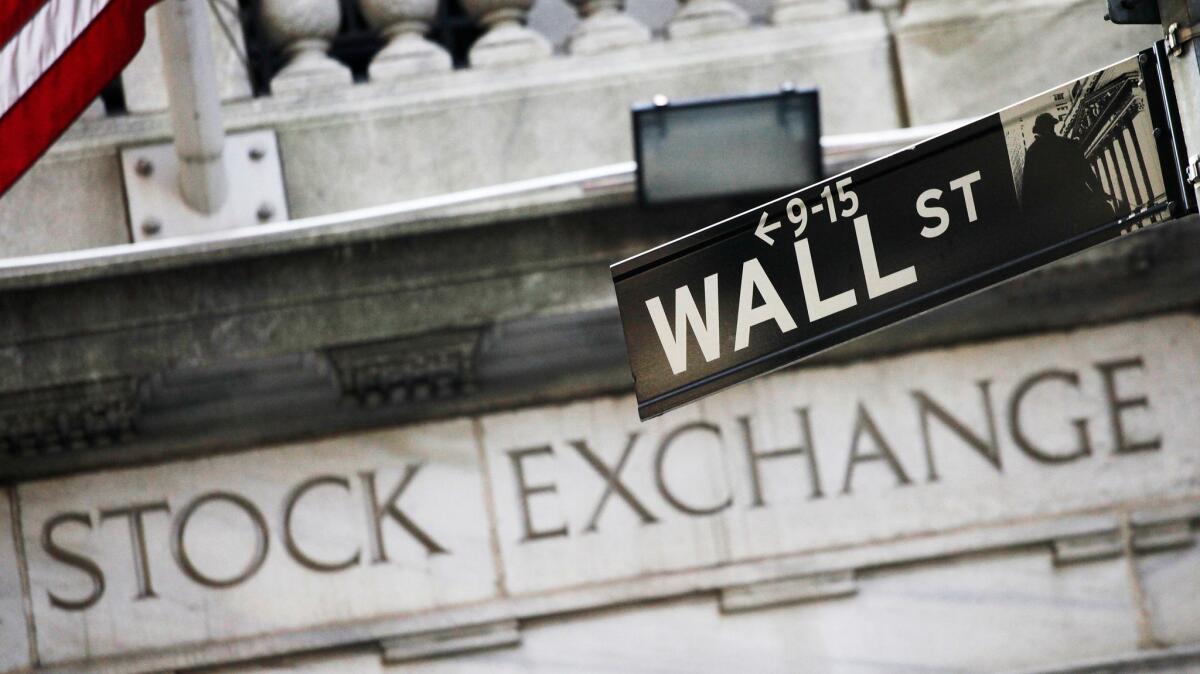Stocks little changed as investors seek safety

- Share via
Investors made a small move back to safer assets Friday afternoon after the government’s November jobs report showed continued hiring but weak wage growth.
Stock indexes finished little changed after real estate and household goods companies rose, but banks, which have soared since the presidential election, took losses.
Most stocks finished higher, and the biggest gains went to companies that pay big dividends, similar to bonds. Investors bought bonds too, and prices rose and yields fell.
The dollar also weakened as investors expected less inflation. Thanks to a loss from Goldman Sachs, which closed at a nine-year high Thursday, the Dow Jones industrial average slipped after closing at a record high the day before.
The jobs report called into question some of investors’ hopes about the state of the economy, and investors reversed some of the moves they’ve made since last month’s presidential election.
Read more: U.S. economy creates 178,000 jobs; unemployment rate drops to 4.6% »
The Dow fell 21.51 points, or 0.1%, to 19,170.42. The Standard & Poor’s 500 index edged up 0.87 of a point to 2,191.95. The Nasdaq composite rose 4.55 points, or 0.1%, to 5,255.65.
The weak finish appeared to mark an end, at least for now, of the post-election rally for U.S. stocks. The S&P 500 and Nasdaq fell this week after a three-week rally took them to record highs. The Dow finished little changed.
The Labor Department said U.S. employers added a net 178,000 jobs in November as hiring remained steady. Investors have long expected that the Federal Reserve will raise interest rates this month, and the jobs report did nothing to dispel that notion. But fewer people looked for work and hourly wages slipped.
Bond prices, which have been falling sharply since the presidential election, rose. The yield on the 10-year Treasury note fell to 2.30% from 2.45%.
Lower bond yields pushed investors to buy utility and real estate companies and makers of consumer goods, which are often compared to bonds because of their big dividend payments. When bond yields fall, those stocks become more appealing to investors seeking income. General Growth Properties rose 2.5% to $25.46 and Exelon rose 2.6% to $33.01. PepsiCo climbed 1.6% to $100.60.
The drop in bond yields also affected banks because yields are linked to long-term interest rates. Lower interest rates mean banks can’t make as much money from lending. Goldman Sachs fell 1.4% to $223.36 and Citigroup slid 2.2% to $56.02.
The financial sector of the S&P 500 is the highest it’s been since 2008, up 13% since the presidential election.
Benchmark U.S. crude rose 1.2% to $51.68 a barrel. Brent crude, the standard for pricing international oils, ticked up 1% to $54.46 a barrel in London. The price of oil surged 12% this week after OPEC countries agreed to trim the production of oil next year. That was the biggest weekly rise in oil prices since February 2011.
The dollar fell to 113.67 yen. The euro rose to $1.0660 from $1.0645.
Starbucks shares slid 2.2% to $57.21 after the coffee chain said Howard Schultz will step down as chief executive in April. He previously gave up the CEO title in 2000, and investors feel Starbucks struggled until he returned to the post in 2008.
Read more: Kevin Johnson to succeed Howard Schultz as Starbucks CEO »
Workday shares tumbled 12.5% to $71.40 after the Pleasanton, Calif., human resources software company gave a weak forecast. CEO Aneel Bhusri said some customers have recently delayed completing large deals, partly because of “global uncertainties such as Brexit, the U.S. presidential election, and pending elections in other G-8 countries.”
Ambarella sank 11.3% to $54.47 after the Santa Clara video-compression chipmaker’s sales forecast fell short of expectations.
Gold rose $8.40 to $1,177.80 an ounce. Silver jumped 33 cents, or 2%, to $16.83 an ounce. Copper fell 2 cents to $2.63 a pound.
Wholesale gasoline rose 1 cent to $1.56 a gallon. Heating oil rose 1 cent to $1.66 a gallon. Natural gas fell 7 cents, or 2%, to $3.44 per 1,000 cubic feet.
The CAC-40 in France fell 0.7% and the FTSE 100 index in Britain slipped 0.3%. Germany’s DAX fell 0.2%. The Nikkei 225 index in Japan shed 0.5% and South Korea’s Kospi lost 0.7%. Hong Kong’s Hang Seng retreated 1.4%.
ALSO
The future of credit-card security may involve blinking numbers
The never-ending election: How to stop recurring campaign donations
What it’s like to be blocked on Twitter by Donald Trump, the incoming leader of the free world
UPDATES:
2:40 p.m.: This article was updated with closing prices and context.
7:45 a.m.: This article was updated with market prices, context and additional details.
This article was originally published at 7:10 a.m.
More to Read
Inside the business of entertainment
The Wide Shot brings you news, analysis and insights on everything from streaming wars to production — and what it all means for the future.
You may occasionally receive promotional content from the Los Angeles Times.










